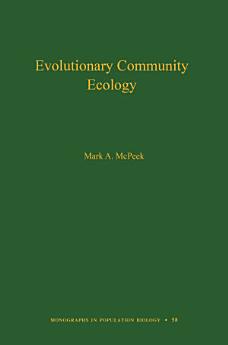Evolutionary Community Ecology
ago 2017 · Monographs in Population Biology Libro 58 · Princeton University Press
eBook
336
Páginas
family_home
Apto
info
reportLas valoraciones y las reseñas no se verifican. Más información
Información sobre este eBook
Evolutionary Community Ecology develops a unified framework for understanding the structure of ecological communities and the dynamics of natural selection that shape the evolution of the species inhabiting them. All species engage in interactions with many other species, and these interactions regulate their abundance, define their trajectories of natural selection, and shape their movement decisions. Mark McPeek synthesizes the ecological and evolutionary dynamics generated by species interactions that structure local biological communities and regional metacommunities.
McPeek explores the ecological performance characteristics needed for invasibility and coexistence of species in complex networks of species interactions. This species interaction framework is then extended to examine the ecological dynamics of natural selection that drive coevolution of interacting species in these complex interaction networks. The models of natural selection resulting from species interactions are used to evaluate the ecological conditions that foster diversification at multiple trophic levels. Analyses show that diversification depends on the ecological context in which species interactions occur and the types of traits that define the mechanisms of those species interactions. Lastly, looking at the mechanisms of speciation that affect species richness and diversity at various spatial scales and the consequences of past climate change over the Quaternary period, McPeek considers how metacommunity structure is shaped at regional and biogeographic scales.
Integrating evolutionary theory into the study of community ecology, Evolutionary Community Ecology provides a new framework for predicting how communities are organized and how they may change over time.
McPeek explores the ecological performance characteristics needed for invasibility and coexistence of species in complex networks of species interactions. This species interaction framework is then extended to examine the ecological dynamics of natural selection that drive coevolution of interacting species in these complex interaction networks. The models of natural selection resulting from species interactions are used to evaluate the ecological conditions that foster diversification at multiple trophic levels. Analyses show that diversification depends on the ecological context in which species interactions occur and the types of traits that define the mechanisms of those species interactions. Lastly, looking at the mechanisms of speciation that affect species richness and diversity at various spatial scales and the consequences of past climate change over the Quaternary period, McPeek considers how metacommunity structure is shaped at regional and biogeographic scales.
Integrating evolutionary theory into the study of community ecology, Evolutionary Community Ecology provides a new framework for predicting how communities are organized and how they may change over time.
Acerca del autor
Mark A. McPeek is the David T. McLaughlin Distinguished Professor of Biological Sciences at Dartmouth College.
Valorar este eBook
Danos tu opinión.
Información sobre cómo leer
Smartphones y tablets
Instala la aplicación Google Play Libros para Android y iPad/iPhone. Se sincroniza automáticamente con tu cuenta y te permite leer contenido online o sin conexión estés donde estés.
Ordenadores portátiles y de escritorio
Puedes usar el navegador web del ordenador para escuchar audiolibros que hayas comprado en Google Play.
eReaders y otros dispositivos
Para leer en dispositivos de tinta electrónica, como los lectores de libros electrónicos de Kobo, es necesario descargar un archivo y transferirlo al dispositivo. Sigue las instrucciones detalladas del Centro de Ayuda para transferir archivos a lectores de libros electrónicos compatibles.







